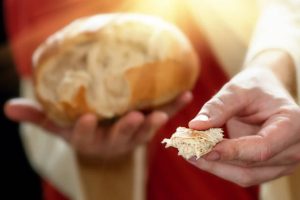12th Sunday after Trinity 2024 St Andrews Milngavie

Today we celebrated the twelfth Sunday after Trinity accompanied by John.
In memory of the late hymn writer Rt Revd Timothy Dudley- Smith who died this week, our hymns were all ones which he had written including Tell Out My Soul and Lord For the Years which were probably his best known ones.
This Week
Tuesday 10am – Prayer Group in the Garden Room.
Wednesday 2.30pm – Book Group – Liz’s
Thursday 10am – Said Holy Communion followed by coffee in Friendship House
Readings for next Sunday – 13th Sunday after Trinity – Joshua 24:1-2,14-18 Ephesians 6:10-20 John 6:56-69
Today’s readings – Ephesians 5:15-20, Proverbs 9:1-6, John 6:51-58
“Speak to one another with psalms, hymns, and spiritual songs, sing and make music in your heart to the Lord.” Ephesians 5:19
Paul’s words to the Ephesians this morning but they speak to us today as this week we received the news that Rt. Revd. Timothy Dudley- Smith, the well know hymn writer had died at the great age of 97. He’d had a long, varied and interesting ministry having been ordained in 1950 eventually becoming the suffragan bishop of Thetford in 1981.
But he was best known for his poetry and hymn writing. Throughout his ministry he wrote hundreds of hymns, some of them very well known. Through his poetical style he continues to portray a great sense of spirituality, which when accompanied by music evokes the spirit of God. This in turn feeds and nurtures our souls which is one of the most important aspects of Christian worship.
This morning’s readings continue the theme of feeding our souls.
In the gospel Jesus uses bread, a symbol of daily life, a very simple, basic but vital commodity to make his point to convey a deep spiritual truth. He describes himself as “the living bread” bread that came down from heaven and emphasises that whoever eats this bread will live forever. His listeners perhaps not surprisingly challenge this. This gives Jesus the chance to reiterate that he is talking about spiritual food and eternal life, life beyond the frontier of death.
The Jews in the crowds would have had some understanding of the concept of “bread from heaven” for they knew of the manna that had sustained their ancestors during the desert exodus but even they would have asked themselves “what is this bread from heaven that Jesus was talking about that would enable them to live for ever?”
As if this wasn’t sufficiently difficult enough for them, Jesus’ listeners were further thrown by his talk of “those who eat of my flesh” John 6:54
And as for drinking his blood, did he not know the strict Jewish food rules and rituals that forbade this?
Of course, Jesus knew these rules, but his challenge was intended to get his followers to look beyond their earthly needs, beyond their stomachs to their spiritual needs and beyond their restricting rituals, to new life within each of them. Jesus most certainly is not advocating cannibalism and the eating of his actual flesh but is inviting his listeners then and us today to feed on his humanity. “Fill your heart, your mind, your soul, your very inner being with me” is what he is saying.
William Barclay the theologian used to say try to imagine being surrounded by well-stocked bookcases. Much knowledge is available in these books but as long as they remain on the shelves – unread – all this array of knowledge is outside us, beyond us. But when we take a book from the shelves, open it and read it, it becomes part of us. It fills our minds and our imagination. Some parts fire our hearts, others lift our spirits. Thereafter whether the book is in our hands or on the shelves, we can feed on it, on its wisdom, knowledge and imagination.
And so it is with Jesus, when we take him into our hearts, consume him, then we can feed on him and all that he offers. Jesus’ divinity was to take him beyond death, beyond the cross to new life and all who drink of him share this life, everlasting life with Jesus himself.
St John’s gospel unlike the synoptic gospels do not contain an account of the institution of Holy Communion but this passage in chapter six is surely John’s version. Christ is saying we must feed off him to live the abundant life. His body and blood are the true bread and the true vine which ensure we remain in God.
In our re-enactment of Jesus’ command at the Last Supper, the Eucharist as we call it, we eat bread and drink wine representing the broken body of Jesus and the blood he shed for us. To the eye the bread may remain bread and the wine may remain wine but by consuming it in faith we take Jesus’ body and blood, his humanity and his divinity into ourselves, into our very being. He becomes part of us as we become part of him.
His presence becomes real to us.
In our liturgy we say “drew near in faith, receive the body and blood of Christ and feed on him in your hearts with faith with thanksgiving”
A small piece of bread, and the merest sip of wine, simple natural, everyday things and yet so important, so vital and they make such a difference, and like our music they feed our soul.
